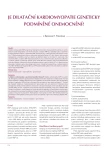-
Medical journals
- Career
Is anti-platelet treatment indicated in primary prevention?
Authors: J. Bultas; D. Karetová
Published in: Kardiol Rev Int Med 2007, 9(4): 242-246
Category: Editorial
Overview
Thrombosis complications of atherosclerosis are the cause of a pandemic of different cardiovascular diseases in the industrialised world. Since the end of the 1980’s there has been a series of studies monitoring the effect of anti-platelet treatment using acetylsalicylic acid (ASA) as part of primary prevention. Almost one hundred thousand probands have been included in these controlled studies. A composite analysis of the results shows that the treatment is effective in the prevention of acute myocardial infarction, finding a clinically and statistically significant reduction in incidence of around one-third. Undesirable effects accompanying the administration of ASA were bleeding, in particular significant bleeding into the digestive tract. This was recorded in 1–2% of those treated. Treatment with lower dosages of ASA should therefore be indicated in primary prevention only for those probands with a higher risk of coronary incident, i.e.
particularly for older men with an accumulation of at least 2 significant risk factors for atherogenesis.Keywords:
atherothrombosis – primary prevention – acetylsalicylic acid – myocardial infarction
Sources
1. Gibson P. Salicylic acid for coronary thrombosis? Lancet 1948; 1 : 965.
2. Colman RW, Hirsh J, Marder VJ et al. Hemostasis and thrombosis. Philadelphia: Lippincott Williams & Wilkins 2001.
3. Gawaz M. Blood platelets. Stutgart: Georg Thieme Verlag 2001.
4. The Steering Committee of the Physicians’ Health Study Research Group. Findings from the aspirin component of the ongoing Physicians Health Study. N Engl J Med 1988 : 318 : 262–264.
5. Petro R et al. Randomised trial of prophylactic daily aspirin in British male doctors. BMJ 1988; 296 : 313–316.
6. Thrombosis Prevention Trial. Lancet 1988; 351 : 233–241.
7. Ridker PM et al. A randomised trial of low dose aspirine in the primary prevention of cardiovascular diseases in woman. N Engl J Med 2005; 352 : 1293–1304.
8. Chan AT et al. Long-term aspirin use and mortality in women. Arch Intern Med 2007; 167(6): 562-572.
9. Hansson L et al. Effects of intensive blood pressure lowering and low-dose aspirin in patients with hypertension. HOT Study Group. Lancet 1998; 351 : 1855–1862.
10. Bhatt DL at al. A global view of atherothrombosis: baseline characteristics in the Clopidogrel for High Atherothrombotic Risk and Ischemic Stabilization, Management,and Avoidance (CHARISMA) trial. Am Heart J 2005; 150(3): 401.
11. De Schryver EL et al. Cochrane review: dipyridamole for preventing major vascular events in patients with vascular disease. Stroke 2003; 34(8): 2072–2080.
12. Patrono C et al. Expert consensus document on the use of the antiplatelet agents. Eur Heart J 2004; 25(2): 166–181.
13. ETDRS Investigators. Aspirin effects on morbidity and mortality in patients with diabetes mellitus. Early Treatment Diabetic Retinopathy Study Report 14. JAMA 1992; 268 : 1292–1300.
14. De Gaetano G et al. Collaborative Group of the Primary Prevention Project. Lancet 2001; 257 : 89–95.
Labels
Paediatric cardiology Internal medicine Cardiac surgery Cardiology
Article was published inCardiology Review

2007 Issue 4-
All articles in this issue
- Is dilatative cardiomyopathy a genetically transmitted disease?
- The painless form of acute myocardial infarction
- Peculiarities of treatment of acute myocardial infarction and diagnostic issues in patients with diabetes mellitus
- The BARI 2D study – secondary prevention and the best treatment strategies in type 2 diabetes patients with ischaemic heart disease
- Is anti-platelet treatment indicated in primary prevention?
- Antiaggregation treatment and drug coated stents in 2007
- Clinical importance of carotid artery distensibility measurement
- Mitral stenosis
- The use of cryodestruction in non–pharmacological treatment of atrial fibrillation
- Current options for surgical treatment of atrial fibrillation
- Cardiology Review
- Journal archive
- Current issue
- Online only
- About the journal
Most read in this issue- Mitral stenosis
- The painless form of acute myocardial infarction
- Is dilatative cardiomyopathy a genetically transmitted disease?
- Is anti-platelet treatment indicated in primary prevention?
Login#ADS_BOTTOM_SCRIPTS#Forgotten passwordEnter the email address that you registered with. We will send you instructions on how to set a new password.
- Career

